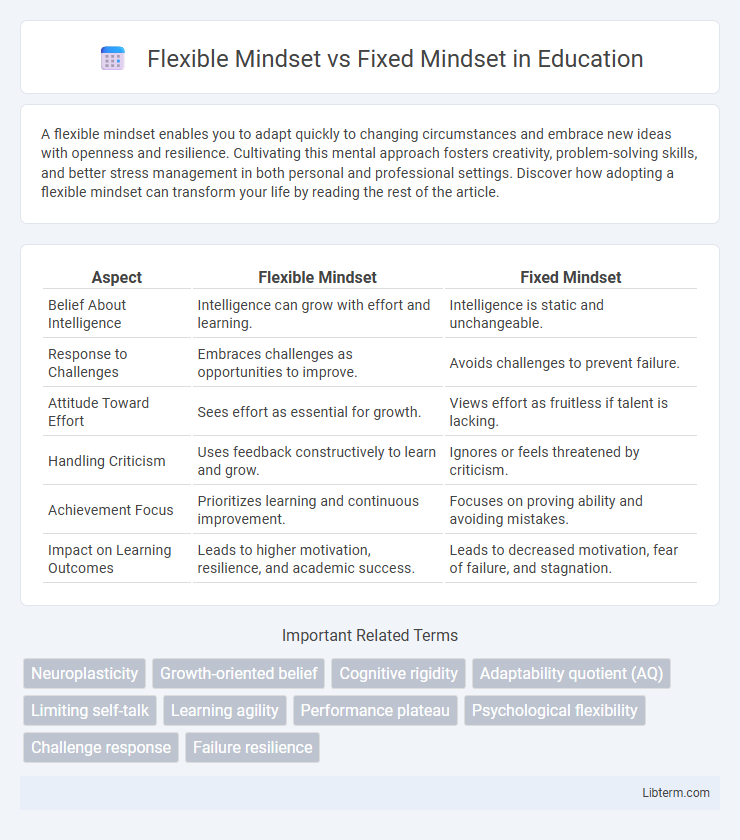A flexible mindset enables you to adapt quickly to changing circumstances and embrace new ideas with openness and resilience. Cultivating this mental approach fosters creativity, problem-solving skills, and better stress management in both personal and professional settings. Discover how adopting a flexible mindset can transform your life by reading the rest of the article.
Table of Comparison
| Aspect | Flexible Mindset | Fixed Mindset |
|---|---|---|
| Belief About Intelligence | Intelligence can grow with effort and learning. | Intelligence is static and unchangeable. |
| Response to Challenges | Embraces challenges as opportunities to improve. | Avoids challenges to prevent failure. |
| Attitude Toward Effort | Sees effort as essential for growth. | Views effort as fruitless if talent is lacking. |
| Handling Criticism | Uses feedback constructively to learn and grow. | Ignores or feels threatened by criticism. |
| Achievement Focus | Prioritizes learning and continuous improvement. | Focuses on proving ability and avoiding mistakes. |
| Impact on Learning Outcomes | Leads to higher motivation, resilience, and academic success. | Leads to decreased motivation, fear of failure, and stagnation. |
Understanding Mindsets: Flexible vs Fixed
Understanding the differences between flexible and fixed mindsets involves recognizing how individuals perceive challenges and learning opportunities. A flexible mindset embraces growth, adapts to setbacks, and views failures as chances to improve skills, whereas a fixed mindset believes abilities and intelligence are static traits, often avoiding challenges to prevent failure. Research by psychologist Carol Dweck highlights that cultivating a flexible mindset enhances resilience, motivation, and long-term success in personal and professional development.
Key Characteristics of a Flexible Mindset
A flexible mindset embraces growth, adaptability, and resilience, viewing challenges as opportunities for learning rather than obstacles. Individuals with this mindset actively seek feedback, persist through setbacks, and demonstrate openness to new ideas and perspectives. Key characteristics include a willingness to change beliefs, continuous self-improvement, and an emphasis on effort over innate ability.
Signs of a Fixed Mindset
Signs of a fixed mindset include avoiding challenges, giving up easily when faced with obstacles, and ignoring constructive feedback. Individuals with this mindset often believe their intelligence and abilities are static, leading to a fear of failure and reluctance to take on new tasks. This mindset limits personal growth by causing resistance to change and a reduced willingness to learn from mistakes.
Impacts on Learning and Growth
A flexible mindset fosters adaptability, resilience, and a willingness to embrace challenges, significantly enhancing learning and personal growth by encouraging continuous effort and improvement. In contrast, a fixed mindset limits potential by causing individuals to avoid challenges and view failures as reflections of innate ability rather than opportunities for development. Embracing a flexible mindset promotes neuroplasticity, which supports skill acquisition and long-term cognitive growth, driving sustained academic and professional success.
How Mindsets Influence Success
A flexible mindset embraces challenges and views failures as learning opportunities, which fosters resilience and continuous improvement essential for long-term success. In contrast, a fixed mindset limits potential by perceiving abilities as static traits, causing individuals to avoid risks and give up easily when faced with obstacles. Research from Stanford psychologist Carol Dweck highlights that adopting a flexible mindset significantly enhances motivation, achievement, and adaptability in diverse professional and personal contexts.
Overcoming a Fixed Mindset
Overcoming a fixed mindset involves embracing challenges as opportunities for growth rather than threats to self-worth. Developing a flexible mindset requires recognizing that abilities and intelligence can be developed through effort, learning, and persistence. Strategies such as positive self-talk, seeking feedback, and reflecting on failures enable individuals to shift from limiting beliefs to a growth-oriented perspective.
Strategies to Cultivate Flexibility
Embracing a flexible mindset involves actively challenging limiting beliefs and seeking diverse perspectives to enhance cognitive adaptability. Regularly practicing mindfulness and reframing setbacks as growth opportunities strengthens resilience and promotes open-mindedness. Setting incremental goals that encourage learning from mistakes fosters continuous personal and professional development.
Real-Life Examples of Mindset Shifts
Employees who embrace a flexible mindset often transform workplace challenges into learning opportunities, such as when a project failure leads to innovative process improvements. In education, students with a growth mindset improve performance by viewing mistakes as essential feedback rather than evidence of inability. Entrepreneurs like Steve Jobs demonstrate mindset shifts by adapting strategies after setbacks, ultimately fostering breakthrough innovations.
Benefits of Embracing a Flexible Mindset
Embracing a flexible mindset enhances adaptability, enabling individuals to navigate challenges and uncertainties with resilience, which fosters continuous personal and professional growth. This mindset promotes open-mindedness and a willingness to learn from feedback and failures, driving innovation and improved problem-solving skills. Cultivating flexibility in thought patterns also supports mental well-being by reducing stress and anxiety associated with rigid expectations.
Steps to Start Changing Your Mindset
Identify and challenge limiting beliefs by recognizing fixed mindset thoughts and replacing them with growth-oriented affirmations. Practice embracing challenges and viewing failures as opportunities to learn and improve cognitive flexibility. Cultivate a habit of reflection and seek feedback regularly to reinforce adaptive thinking patterns and foster continuous personal development.
Flexible Mindset Infographic

 libterm.com
libterm.com